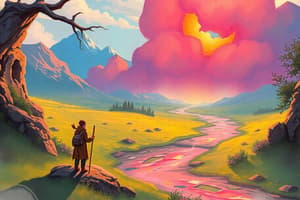Podcast
Questions and Answers
What distinguishes poetry from other literary genres?
What distinguishes poetry from other literary genres?
- It often employs a distinctive style and rhythm. (correct)
- It is always written in prose form.
- It consists solely of fictional narratives.
- It focuses exclusively on factual reporting.
Which of the following is NOT a characteristic of fiction?
Which of the following is NOT a characteristic of fiction?
- Can include scientific facts. (correct)
- Is typically written in prose form.
- Presents invented narratives.
- Describes imaginary events and people.
In which type of writing is the writer's emotional expression primarily emphasized?
In which type of writing is the writer's emotional expression primarily emphasized?
- Descriptive writing
- Academic writing
- Imaginative writing (correct)
- Technical writing
Which type of writing would include user manuals and standard operating procedures?
Which type of writing would include user manuals and standard operating procedures?
What is the primary goal of persuasive writing?
What is the primary goal of persuasive writing?
What type of writing is described as using chronological order for actual events?
What type of writing is described as using chronological order for actual events?
Which of the following represents an example of expository writing?
Which of the following represents an example of expository writing?
Which literary genre typically focuses on real events and facts?
Which literary genre typically focuses on real events and facts?
Which form of writing aims to create vivid imagery for the reader?
Which form of writing aims to create vivid imagery for the reader?
What kind of writing would be classified as academic writing?
What kind of writing would be classified as academic writing?
Flashcards
Poetry
Poetry
A literary work focusing on expressing feelings and ideas using distinctive style and rhythm.
Fiction
Fiction
Imaginary events and people described in prose.
Non-Fiction
Non-Fiction
Writing about real events and facts.
Drama
Drama
Signup and view all the flashcards
Imaginative Writing
Imaginative Writing
Signup and view all the flashcards
Technical Writing
Technical Writing
Signup and view all the flashcards
Academic Writing
Academic Writing
Signup and view all the flashcards
Persuasive Writing
Persuasive Writing
Signup and view all the flashcards
Narrative Writing
Narrative Writing
Signup and view all the flashcards
Descriptive Writing
Descriptive Writing
Signup and view all the flashcards
Expository Writing
Expository Writing
Signup and view all the flashcards
Study Notes
Creative Writing 2024
- Course offered by the National College of Science and Technology
- Covers four main literary genres and other writing forms
Four Main Literary Genres
- Poetry: A literary work expressing feelings and ideas intensely through distinctive style and rhythm
- Fiction: Prose that describes imaginary events and people; it is something invented or untrue
- Non-Fiction: Writing about real events and facts, not invented stories
- Drama: An exciting, emotional, or unexpected series of events; a play for theater, radio, or television
Types of Writing
- Imaginative: Used to express thoughts, ideas, and stories using feelings and emotions
- Examples: Novel writing, short stories, poetry, song lyrics
- Technical: A form of communication professionals use to convey information about specialized topics
- Examples: User manuals, employee handbooks, standard operating procedures, software user documentation, troubleshooting guides
- Academic: A formal writing style used in universities and scholarly publications
- Examples: Journal articles, books on academic topics, essays, research papers, dissertations
Other Forms of Writing
- Persuasive: A text that tries to convince the reader of a point of view
- Examples: Advertisement copy, editorials, book reviews
- Narrative: A story that can be actual events in chronological order or imagined events in a timeline created by the author
- Examples: Essays, fairy tales, movies, jokes
- Descriptive: Writing that creates a vivid image of what's being described in the reader's mind
- Examples: "My mind is in the air", "She has teary eyes", "He looks very handsome"
- Expository: Writing used to explain, give information, and support the topic with evidence, details, and facts
- Examples: Educational books, political books, thesis/research papers
Studying That Suits You
Use AI to generate personalized quizzes and flashcards to suit your learning preferences.




